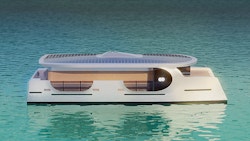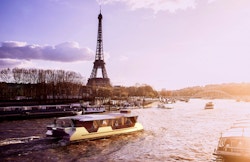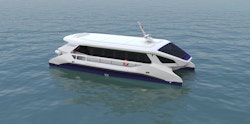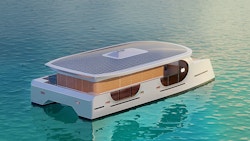EODev+NepTech, winners Call for Innovation "Paris 2024 Mobility"
Jean-Baptiste Djebbari, Minister Delegate in charge of Transport, named NepTech and EODev amongst the winners of the “Olympic and Paralympic Games Paris 2024 Mobilities” call for innovations in the New Mobilities & Active Mobilities category, “River” section, thanks to their project to design and operate passenger shuttles equipped with a hydrogen propulsion system on the Seine river and in Marseille during JOP 2024.
The innovative ships designed by NepTech for transporting passengers on the Seine and in Marseille will be equipped with EODev hydrogen solutions, developed in collaboration with Toyota.
EODev's STSH2 river and maritime hydrogen distribution station, one of whose strengths is to be self-propelled, will be anchored as close as possible to the Olympic venues. NepTech is responsible for the naval design of the refueling station.

More than a project, two solutions that combine expertise
The project, selected among 120 applications, aims to design and operate passenger shuttles equipped with a hydrogen propulsion system on the Seine and in Marseille during the JOP 2024. The project plans to associate the NepTech zero-emission, efficient and intelligent vessels, with the floating hydrogen refueling stations developed by EODev.
The project brings together three players in hydrogen mobility who combine their respective know-how: NepTech for the design of innovative passenger ships powered by hydrogen ; EODev for the development of terrestrial & maritime hydrogen solutions; and Toyota, a technological leader in environmentally friendly solutions and a pioneer in hydrogen mobility. The technology on board NepTech ships is based on the hydrogen fuel cell developed by Toyota and adapted for the maritime and river sector by EODev teams.

NepRiver & NepShuttle, for environmentally friendly mobility
NepRiver for river use, and NepShuttle for maritime use, have been designed by NepTech. They will have a long range and will be able to carry up to 150 passengers. They are built around a platform with common structural and hydrodynamic characteristics.
Hearing the announcement, Tanguy Goetz, CEO, NepTech commented, «The NepTech team is delighted to contribute with EODev to the emergence of a responsible and innovative transport solution. Being the winner of this call for mobility innovation will undoubtedly facilitate the long-term deployment of our solutions in the territories of the JOP 2024 ».
NepRiver (21m long, with a cruising speed of 12kmh and maximum speed of 20kmh) and NepShuttle (24m long, with a cruising speed of 35kmh and maximum speed of 40kmh) will be equipped with RexH2® from EODev and stabilizers in order to guarantee great navigation comfort at high speed in marine environment. A unique and tailor-made maritime and river solution, EODev's RexH2® (Range Extender Hydrogen), is a modular electro-hydrogen generator developed around Toyota's fuel cell technology.
The innovations developed by NepTech allow the vessel's energy consumption to be reduced by around 30 to 40% when compared to a similar vessel. The integration of the hydrogen propulsion supplied by EODev avoids the emission of CO2 and fine particulates. The reduction in CO2 emissions is thus estimated at 1,100 tonnes per year per ship on average.
The use of the hydrogen powered NepTech ships on the Seine & in Marseille do not produce noise pollution, which is known to be particularly damaging to marine species and their communication. The use of recyclable and bio-sourced materials in the manufacturing process of the ships will significantly reduce the carbon footprint, not only in operation, but also during their construction. This equipment will be produced and assembled in France.

Station Ship STH2, the smart solution for hydrogen refueling
Hydrogen-powered ships cannot be refueled by the land-based hydrogen stations used to date. EODev has therefore designed and developed a multi-function solution (STSH2) which could allow the refueling of ships but also of other vehicles within the framework of the development of the French hydrogen sector.
Relying on technologies for combining and optimizing the energy mix from the use of renewable energies tested on board the Energy Observer laboratory vessel, EODev is thus developing a mobile hydrogen supply station that has the capacity to distribute and / or produce hydrogen on board using a seawater desalination and electrolysis system. NepTech is in charge of the station's architecture and naval engineering, when EODev takes care of the project management and the integration of the hydrogen storage and distribution system.
As part of the winning project, the station will be able to load up to 480kg of hydrogen in racks of standardized hydrogen tanks, so that it can quickly refuel the NepRiver and NepShuttle units. Equipped with two 80kw electric motors,and 88kWh of batteries, it will have a range of up to 210 nautical miles. The station will thus also be shared for other mobility uses.
Anthony Vernizeau, Key Account Manager in charge of EODev's Calls for Innovations observed : «Technically our industrial solutions are already operational, whether on Energy Observer or other maritime & river projects. We are delighted with the collaboration with NepTech and also hope that this call for mobility innovation within the framework of the Paris 2024 Olympic and Paralympic Games will make it possible to accelerate the adaptation of regulations that is necessary for the large-scale deployment of infrastructures not only for production but also for the supply of green hydrogen, in particular for river and maritime use ».
The first unit is scheduled to be launched for the summer of 2023.

The winners wish to thank Comité des Mobilités, which has been working on the project in collaboration with the Interministerial Delegation of the Olympic and Paralympic Games, the City of Paris, Ile-de-France Mobilités, Paris 2024, Plaine Commune, Paris Terres d'Envol, the regional prefecture of Ile-de-France / DRIEA, the departmental council of Seine-Saint-Denis, SOLIDEO, Voies Navigables de France and Gustave Eiffel University.